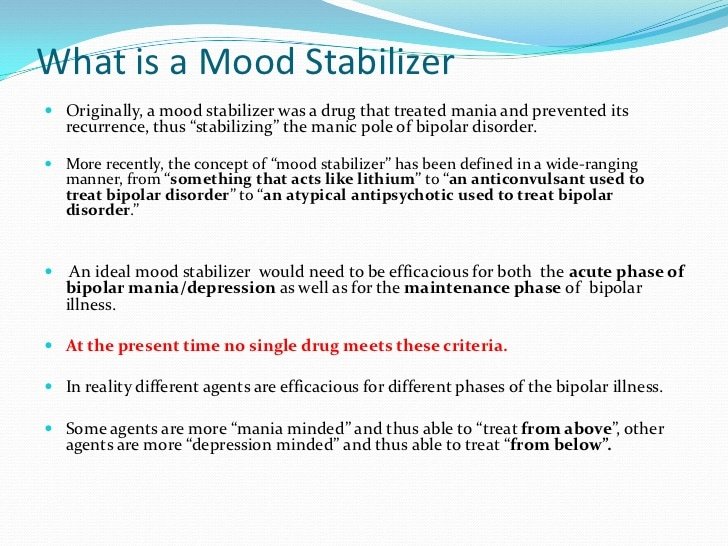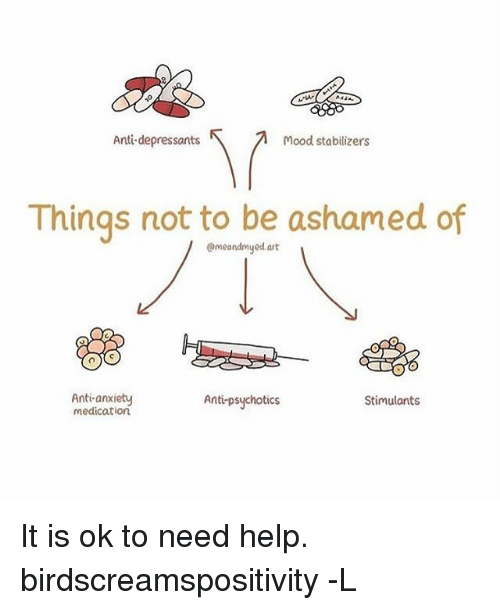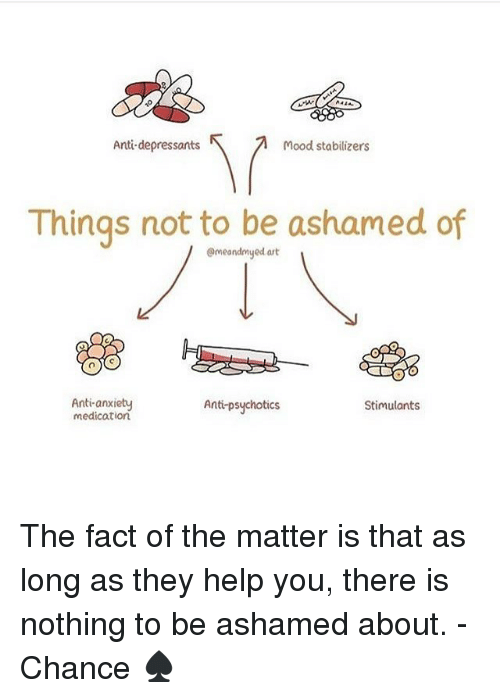How Does Lamotrigine Work
While the exact mechanism of action is not entirely understood, lamotrigine delays the time between mood changes and manic or depressive states in people with bipolar disorder by decreasing the intensity of irregular electrical activity in the brain. People with bipolar disorder are at high risk of experiencing recurrent and relapsing episodes of mood change. Maintenance treatment with lamotrigine helps reduce the risk by preventing or delaying these recurrences and relapses.
Many clinicians think that lamotrigine helps achieve and sustain even moods over time by virtue of its antidepressant properties, rather than anti-manic properties, says Dr. Goldberg. It works with mood stabilizers like lithium and Divalproex, but its not interchangeable with these drugs and cannot be used in their place.
The efficacy of lamotrigine appears to be similar to the effects of lithium, yet is better tolerated.
Lamotrigine is used over time as a preventative medication. Clinical trials that looked at lamotrigines potential for treating acute episodes of mania found no difference between the medication and placebo.2
Medicines For Bipolar Depression
Most of the time, doctors will start bipolar disorder treatment by prescribing a mood-stabilizing drug like lithium. But the FDA has approved some medicines for bipolar depression, too:
- Quetiapine fumarate
- Lurasidone . You might take it alone or with lithium or valproic acid.
For some people, traditional antidepressants may trigger a manic episode. Because of this risk, your doctor should keep track of you closely if you take one.
Types Of Mood Stabilizing Medication
The oldest and most studied of mood stabilizers is lithium. However, many drugs that were first developed as anticonvulsants to treat epilepsy also act as mood stabilizers. These include carbamazepine, divalproex and lamotrigine. Gabapentin and topiramate are also anticonvulsants that may act as mood stabilizers, but they are usually given in addition to other medications.
Lithium
Lithium is found in nature in some mineral waters and is also present in small amounts in the human body.
Lithium is used to treat mania and to prevent further episodes of mania and depression.
Common side-effects of lithium include increased thirst and urination, nausea, weight gain and a fine trembling of the hands. Less common side-effects can include tiredness, vomiting and diarrhea, blurred vision, impaired memory, difficulty concentrating, skin changes and slight muscle weakness. These effects are generally mild and fade as treatment continues. If, however, any of these effects are severe, they should be reported to your doctor immediately. Thyroid and kidney function can be affected by lithium in some people and must be monitored regularly by your doctor.
Changing the amount of salt you use can also affect lithium levels: avoid switching to low- or no-salt diets.
Signs that the amount of lithium in the body is higher than it should be include severe nausea, vomiting and diarrhea, shaking and twitching, loss of balance, slurred speech, double vision and weakness.
Carbamazepine
You May Like: Phobia Medical Definition
Anxiolytics And Other Medications
Steven Gans, MD is board-certified in psychiatry and is an active supervisor, teacher, and mentor at Massachusetts General Hospital.
Research has found that anxiety is common in people with bipolar disorder, with more than half of people experiencing one or more anxiety disorders. Other people may not have enough anxiety symptoms to be formally diagnosed with an anxiety disorder but still need medication to manage their symptoms. Anxiousness, worry, agitation, and insomnia, for example, are often experienced during bipolar depression and mixed episodes. Anxiety symptoms such as restlessness, worry and irritability may occur during mania and hypomania. Thus, it’s common for bipolar people to have anti-anxiety medications prescribed.
Anxiety medications, also called anti-anxiety medications or anxiolytics, are prescribed for anxiety disorders as well as for people who have anxiety along with bipolar disorder or major depression. Anxiety medications help to make people less anxious and also help to ease restlessness and worrying. Many of these medications also help people to sleep better. Let’s take a look at the different categories of medications which are used to treat anxiety and how they may be used for people with bipolar disorder.
Are Mood Stabilizers Used For Anxiety

Are mood stabilizers used for anxiety? Mood stabilization is generally the first priority before addressing the anxiety disorder. Polypharmacy is the rule in the treatment of comorbid bipolar and anxiety disorders. Mood stabilizer monotherapy is unlikely to be effective for all symptoms.
What is the best mood stabilizer for anxiety? Lamotrigine is the only mood stabilizer that calms mood swings by lifting the depression rather than suppressing the mania, says Dr. Aiken. That makes it a great choice for the bipolar spectrum, where the depressive symptoms usually outweigh the manic ones.
How do I know if I need mood stabilizers? Your doctor may prescribe mood stabilisers if you have an episode of mania, hypomania or depression that changes or gets worse suddenly. This is called an acute episode. Some people need to take mood stabilisers as a long-term treatment to stop this from happening.
What mental illnesses use mood stabilizers? Mood stabilizer drugs are commonly used to treat people with bipolar mood disorder and sometimes people with schizoaffective disorder and borderline personality disorder. In some cases, theyre used to supplement other medications, such as antidepressants, to treat depression.
Recommended Reading: Pristiq Indications
Why Natural Mood Stabilizers
In the Eastern regions of the world, natural mood stabilizers have been used to treat such chemical imbalances. However, patients and physicians seeking to find alternatives for mood disorders in the western world have begun to branch out into more natural solutions. Many do this as a way to curtail the major undesirable side effects of conventional prescription mood stabilizers. Some of the side effects associated with prescription drugs that patients and doctors seek to avoid run the gamut from depressive symptoms to psychosis or suicidal thoughts and behaviors.
Best Natural Mood Stabilizers
As previously mentioned, there is not one natural mood stabilizer that stands above the rest. All of us have different compositions, so what works for one person might not work for the other. However my personal favorites are Shilajit, Ashwagandha, and Ginseng. All of them are well tolerated and several studies have been conducted on them as far as herbal supplements go.
Since natural mood stabilizers are available in a diverse array of treatment options, each one having a unique effect on the individual taking them, there is no one way to consume them that would be considered more effective. Many enjoy the aromatic treatments such as ginseng and lavender as an oil in aromatherapy regimens while other natural mood stabilizers can be taken via methods of teas, tonics, pills and powders. When seeking out information regarding the best method of consumption for any single treatment, it is recommended that one seek the advice of both an herbalist and a registered physician.
As is the case with their prescription counterparts, it is recommended that individuals interested in pursuing the benefits of natural mood stabilizers should do so in conjunction with a lifestyle conducive to healthy physical, mental, and emotional health. Such factors include exercise, proper sleeping habits, regular consumption of healthy meals high in protein, omega-3 fatty acids, and vitamin b-12, while limiting the intake of unhealthy carbohydrates.
References:
Recommended Reading: Bipolar And Childhood Trauma
Medications For Mood Disorders
There are many safe, effective medications that may be prescribed to relieve symptoms of a mood disorder. While doctors do know something about the typical effects of medication , you are an individual and your reaction may not be the same as someone elses.
If you decide to explore medication as a treatment option, you and your doctor will need to work together to find the right medication or combination of medications for you. This process may take some time, so dont lose hope. Many people need to try several medications before they find the best one.
Your health care provider might prescribe one or more medications to treat your symptoms. These may include:
Natural Mood Stabilizers For Depression Anxiety Anger And More
Are you or a family member or friend struggling to stabilize your mood because of bipolar, depression, anxiety, anger and other mental and emotional disorders and finding it very difficult?
Would you love to find healthy, natural holistic alternatives to prescription anti-depressants and other over-the-counter medications to better stabilize your mood because of social anxiety, depression or bipolar disorder?
Then I hope my research on natural mood stabilizers presented on this page will be of great benefit to you!
Were going to answer some basic questions, check some facts and if youre a more visual person, I have an informative infographic and great video posted a little later that youll no doubt enjoy and benefit from.
At the very end, Im going to ask a quick favor from you! .
But, first things first
Read Also: Sesquipedalophobia Vs Hippopotomonstrosesquippedaliophobia
Which Conditions Are Treated With Lamotrigine
Although lamotrigine is not considered an antidepressant, it is used as a maintenance treatment for bipolar I disorder in patients 18 and older to help stabilize mood changes by delaying the time to occurrence of mood episodes in patients treated for acute mood episodes with standard therapy. 1,2
It is considered second-line therapy. The drug manufacturers original studies of lamotrigine in bipolar depression found that improvements were stronger in bipolar 1 than bipolar II disorder, Dr. Goldberg recalls. Newer research suggests, however, that lamotrigine may be even more effective as a mood stabilizer in preventing relapses in treating bipolar II disorder.2
There are also conditions lamotrigine treats off-label including borderline personality disorder, schizoaffective disorder, and obsessive-compulsive disorder , Dr. Aiken says.
Don’t Judge Yourself For Being Emotional
As humans, it’s natural to become emotional every now and then. Take your emotions for what they are and validate them as real feelings, without judging yourself for being vulnerable. “If you can non-judgmentally observe their presence, they will reach their peak more quickly and eventually dissipate without any effort on your behalf,” says Hudson, regarding the amount of time it takes for intense emotions to vanish. If you start hating on yourself, you will only feel worse.
Read Also: Pristiq Irritability
Antidepressants For Acute Bipolar Depression: A Summary Of The Efficacy Data And Meta
Over the last decade, a number of reviews and meta-analyses have examined the relative small research literature on the efficacy of antidepressants in bipolar depression. Studies in this area included studies with either only bipolar I or a combination of bipolar I and bipolar II patients. . Both narrative reviews and meta-analyses differ in their conclusions, reflecting subtle but important differences in study inclusion/exclusion criteria and statistical techniques. As examples, Sidor and MacQueen included 7 studies in their meta-analysis, McGirr et al. included 6 studies, while Vasquez et al. included 10 studies. Considering either response, remission or both, two of these meta-analyses found no significant efficacy of antidepressants in bipolar depression while another found efficacy with a relative risk =1.43 and with a number to treat =6.2. Using a different approach, an additional analysis examined all studies comparing antidepressant efficacy in unipolar and bipolar depressed patients and found no difference in efficacy . Finally, a meta-analysis which compared antidepressants for bipolar depression to separate studies on antidepressants in unipolar depression found comparable efficacy .
Thus, the only reasonable conclusion would be that, with the relative paucity of data available, the effectiveness of antidepressants, whether prescribed as monotherapy or adjunctive to mood stabilizers for bipolar depression is still unproven .
Is It Ok To Suddenly Stop Taking Lamotrigine

It is NOT recommended to discontinue lamotrigine abruptly, as this may increase risk of seizures. Consult your doctor before stopping lamotrigine. If you do stop for more than a few days, DO NOT restart at your current dose. Call your doctor to review your dosing schedule.
Don’t Miss: Pristiq For Panic Disorder
What Is A Mood Disorder
A mood disorder is a mental health problem that primarily affects a persons emotional state. It is a disorder in which a person experiences long periods of extreme happiness, extreme sadness, or both.
It is normal for someones mood to change, depending on the situation. However, to be diagnosed with a mood disorder, symptoms must be present for several weeks or longer. Mood disorders can cause changes in your behavior and can affect your ability to deal with routine activities, such as work or school.
Two of the most common mood disorders are depression and bipolar disorder. This article will review these disorders and some of their many subtypes.
Depression . Depression is a common mental disorder. Grief or sadness is a typical response to a traumatic life event or crisis, such as the death of a spouse or family member, loss of a job, or a major illness. However, when the depression continues to be present even when stressful events are over or there is no apparent cause, physicians would then classify the depression as clinical or major depression. For a person to be diagnosed with clinical depression, symptoms must last for at least two weeks.
There are several different types of depression. Symptoms may vary depending on the form of the disorder.
There are four basic types of bipolar disorder.
Other mood disorders
Can You Take Mood Stabilizers While Pregnant Or Breastfeeding
Antipsychotics can be utilized during pregnancy and breastfeeding if the possibility of side effects is understood. If lithium is used in pregnancy, close monitoring of levels and the fetus is advisable, and in breastfeeding, lithium may best be avoided. Valproic acid and carbamazepine have considerable risks in pregnancy and are avoided if possible, but they are more commonly used during breastfeeding if monitoring is conducted.
You May Like: How To Motivate Yourself To Workout When Depressed
What Are The Possible Side Effects Of Anti
Like other medications, anti-anxiety medications may cause side effects. Some of these side effects and risks are serious. The most common side effects for benzodiazepines are drowsiness and dizziness. Other possible side effects include:
- Nausea
- Excitement
- Trouble sleeping
Anti-anxiety medications may cause other side effects that are not included in the lists above. To report any serious adverse effects associated with the use of these medicines, please contact the FDA MedWatch program using the contact information at the bottom of this page. For more information about the risks and side effects for each medication, please see
Will I Need To Take Other Medication As Well As A Mood Stabiliser
A combination of a mood stabiliser and another drug might be the best way to manage your symptoms. This depends on your diagnosis and the problems you experience. The other kinds of medication that you may be offered include:
See our pages on treatments for bipolar disorder, treatments for mania and hypomania, and treatments for depression to find out more about other treatments you may be offered alongside mood stabilisers.
You May Like: Can A Panic Attack Cause You To Faint
First Line/classic Treatments For Acute Bipolar Depression
The consensus in the field is that non-antidepressant treatments should be considered as monotherapy before using antidepressants to treat bipolar depression . . The medications with the best data from randomized controlled trials are second generation antipsychotics . Although this partly reflects the capacity of pharmaceutical firms to fund large scale studies, the consistent efficacy across multiple studies suggests true antidepressant activity. The two SGAs with the best data are quetiapine and lurasidone, both of which demonstrated efficacy in at least two large scale placebo controlled studies . Olanzapine and cariprazine have also shown efficacy in at least one double-blind study each. Not all SGAs have shown consistent efficacy. Ziprasidone was ineffective in one controlled study while aripiprazole failed its registrational trials . In general, optimal doses of SGAs for bipolar depression are substantially lower than the doses used to treat acute psychosis or acute mania .
How Long Does It Take To Work
In certain cases, the antidepressant and antimanic benefits of lamotrigine are noticed pretty early on in the treatment cycle, says Dr. Aiken. For some other patients, though, effects are seen after about a month of being on lamotrigine treatment. But there will always be others that take a bit longer to experience the positive effects.
Read Also: What Is The Fear Of Vomit Called
What If I Want To Stop Taking Mood Stabilisers
Do not stop taking your mood stabiliser without first talking to your doctor. If you need to stop, your doctor can reduce the dose slowly over a few weeks. You should look out for signs of your illness returning if you are stopping your medication.
You may get withdrawal symptoms if you stop taking your medication suddenly. These symptoms depend on the medication you are taking. Talk to your doctor about withdrawal symptoms before stopping your medication.
Dallas Behavioral Healthcare Hospital: Comprehensive Mental Health Treatment

Dallas Behavioral Healthcare Hospital utilizes an evidence-based, highly-structured, and comprehensive treatment program for mood disorders and other mental health conditions.
A variety of life events can trigger mood disorders, and no two cases of mood disorders are the same. That is why we provide both inpatient psychiatric treatment options and intensive outpatient treatment options, which our clinicians use to develop a personalized treatment plan for each patient. Our staff includes psychiatrists, registered nurses, social workers, dieticians, and activity therapists who assist with each patients integrative recovery process.
If you or a loved one is facing a mood disorder or mental health crisis, do not hesitate to contact Dallas Behavioral Healthcare Hospital. We are also available by phone at .
You May Like: Dehydration And Panic Attacks